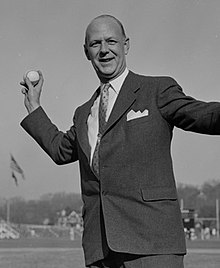Howard J. Whitmore Jr.
Howard J. Whitmore Jr. (May 9, 1905 – June 19, 1998) was an American politician who was a member of the Massachusetts House of Representatives from 1947–1953 and Mayor of Newton, Massachusetts from 1954–1959.
Howard J. Whitmore Jr. | |
|---|---|
 | |
| Mayor of Newton, Massachusetts | |
| In office January 1, 1954 – December 31, 1959 | |
| Preceded by | Theodore R. Lockwood |
| Succeeded by | Donald L. Gibbs |
| Metropolitan District Commissioner | |
| In office 1964–1970 | |
| Preceded by | Robert F. Murphy |
| Succeeded by | John W. Sears |
| Member of the Massachusetts House of Representatives | |
| In office 1947–1953 | |
| Personal details | |
| Born | May 9, 1905[1] Newton, Massachusetts[1] |
| Died | June 19, 1998 (aged 93)[2] Boston, Massachusetts[2] |
| Political party | Republican[1] |
| Residence | Newton, Massachusetts |
| Alma mater | Harvard College[1] |
| Occupation | Investment counsel[1] |
Early years
A native of Newton, Massachusetts, Whitmore played baseball for Newton High School.[3] He went on to Harvard College, was a "star right-hander" pitching for the Crimson baseball team, and graduated in 1929.[4][5] After his freshman year at Harvard in 1926, he played summer baseball for Chatham in the Cape Cod Baseball League.[3]
Political career
Whitmore's political career began in 1940 when he was elected to the Newton Board of Aldermen.[2] From 1947–1953, he was a member of the Massachusetts House of Representatives, where he was the Chairman of the House Committee on Ways and Means. He left the House in 1953 after being elected Mayor of Newton.
Whitmore did not seek reelection in 1959. He was considered to be a frontrunner for the Republican nomination for Governor in 1960, but dropped out of the race after he lost the convention vote to John A. Volpe. He was the Republican nominee for United States Senate in 1964. He lost to incumbent Ted Kennedy by over one million votes.
Later years
After his defeat in the 1964 Senate race, Whitmore was named Commissioner of the Metropolitan District Commission, a post he held until 1970.[2] He died in Boston, Massachusetts in 1998 at age 93.
References
- Public officers of the Commonwealth of Massachusetts 1951-1952.
- "Howard Whitmore Jr., 93; legislator, Newton mayor, '64 Senate candidate". Boston Globe. June 21, 1998. Retrieved 2010-08-12.
- "Chatham Star Players". Harwich Independent. Harwich, MA. July 14, 1926. pp. Supp.
- "Balltossers Face St. Bonaventure in Tenth of Season". The Harvard Crimson. May 4, 1929. Retrieved June 11, 2020.
- http://www.thecrimson.com/article/1929/5/20/peterson-pitches-penn-to-3-0-win/
| Party political offices | ||
|---|---|---|
| Preceded by George C. Lodge |
Republican nominee for U.S. Senator from Massachusetts (Class 1) 1964 |
Succeeded by Josiah Spaulding |